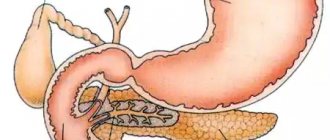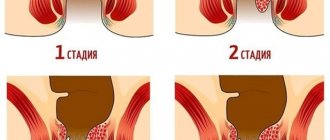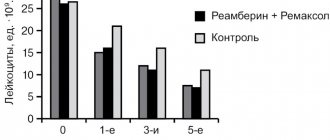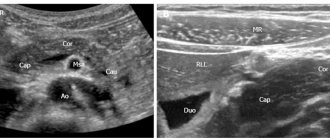Intoxication due to constipation is almost inevitable if the intestines become clogged with feces. This situation requires an immediate solution, because otherwise all body systems may suffer.
Constipation is a problem that involves difficulty or insufficiency in the passage of stool. It is considered a symptom of various gastrointestinal diseases, and not an independent disease.
Intoxication of the body with constipation begins if bowel movements do not occur for more than two days. Anyone can encounter this pathology over time. And if you take the problem lightly and do not take any measures, everything can result in serious consequences for your health.
The occurrence of intoxication due to constipation
If the intestines work normally, useful substances are absorbed into the blood through its walls, and all unnecessary and harmful wastes are eliminated.
Fecal matter is, in fact, “industrial waste” that must be removed. If this does not happen in a timely manner, the feces accumulating in the large intestine rot, and putrefactive toxins enter the bloodstream, which spread throughout the body and poison it.
The development of intoxication can occur both with one-time, long-term constipation, and when it occurs systematically. Frequent regular constipation leads to inevitable disruption of the intestinal microflora and premature wear of its walls as a result of exposure to rotting feces.
Constipation can be caused by various reasons:
- unhealthy diet
- sedentary lifestyle,
- various diseases of the stomach or intestines, genitourinary system,
- stress, depression, nervous system diseases,
- some poisoning (nicotine, lead, mercury vapor or products with tanning properties),
- diseases of the anorectal area (hemorrhoids, etc.),
- tumors, adhesions in the intestines,
- large loss of fluid and insufficient replenishment.
Many diseases can be associated with intoxication caused by constipation. This happens because toxins are carried by the blood throughout the body. Once in the organs, poisons have a detrimental effect on their functioning, which leads to the development of various disorders. Often only a truly competent specialist can discern the connection between a sudden illness and intoxication due to constipation.
How does chronic constipation manifest?
The clinical picture of this disease largely depends on the cause of its occurrence. The dominant symptom is an increase in the time intervals between acts of defecation, up to several days in a row, as well as an increase in the duration of the act of defecation itself and the constant need to strain. In addition to the listed symptoms, chronic constipation is accompanied by a number of clinical signs:
- increased gas formation in the intestines (flatulence);
- recurrent abdominal pain (in the peri-umbilical, right or left iliac region);
- changes in the consistency of stool, periodic diarrhea with mucus in the stool;
- partial or complete loss of appetite;
- the appearance of bad breath;
- belching air.
In addition, chronic constipation in an adult negatively affects the psycho-emotional state and can provoke depressive disorders, apathy, decreased performance, impaired concentration, and obsession with one’s problem.
Symptoms of intoxication
General signs of intoxication from constipation in adults are often similar to symptoms of other poisonings:
- heaviness and pain in the abdomen,
- sometimes vomiting
- loss of appetite,
- state of fatigue and lethargy,
- pain in and around the liver,
- feeling of fullness in the intestines,
- a change in the color of urine to a darker one, and its smell becomes extremely unpleasant, pungent,
- Sometimes dermatological problems in the form of rashes and peeling on the skin are possible.
Read also: Nitrate poisoning in humans
The longer feces are not removed from the intestines, the more intense the process of decay occurs. This means that intoxication of the body is also increasing, becoming more severe every hour and day. And if poisoning is left to chance, its chronic form will certainly develop with serious manifestations and consequences.
Symptoms of intoxication will directly depend on the chemical properties of the toxins and their quantity, time of exposure and regularity of manifestation.
In case of acute intoxication, a person will notice:
- headaches,
- pain and aches in joints, muscles,
- nausea with vomiting,
- loss of appetite,
- elevated temperature,
- constant or frequent weakness,
- heaviness in the intestines, abdominal pain,
- frequent urge to defecate with the impossibility or difficulty of doing so.
The chronic form with constant constipation manifests itself as follows:
- loss of appetite
- a yellow coating appears on the tongue,
- the breath smells bad due to rotting feces in the intestines,
- body weight changes,
- have frequent or constant headaches,
- sleep is disturbed
- swelling occurs due to fluid retention,
- performance decreases,
- hair and nails become brittle,
- nervousness develops as a reaction of the nervous system to poisons,
- immunity decreases,
- kidney function is impaired.
The skin is not left out either. One of its functions is to remove waste and toxins out. But due to intoxication, it cannot fully perform its work; it becomes porous, rough, and flaky. As a result, rashes appear on the skin (usually on the forehead and temples), and dermatitis of varying degrees of severity develops.
In children, signs of intoxication may be more severe:
- pressure in the anal area,
- flatulence,
- overstretching of the intestine and its injuries due to increased emptying,
- irritability,
- anorexia,
- anemia,
- pustular rashes, acne.
Young children under one year of age and older should have bowel movements 1–2 times a day. If a child has less frequent bowel movements, this is considered constipation.
Intoxication of the body due to constipation
The article was prepared by a specialist for informational purposes only. We urge you not to self-medicate. When the first symptoms appear, consult a doctor.
It is no coincidence that among many serious disorders in the functioning of the important human gastrointestinal tract, constipation plays a major role. They greatly poison life, both literally and figuratively. Such a rather delicate problem can and should be solved immediately after its occurrence. In some cases, it is enough to change your daily diet using a certain diet, slightly adjusting your usual daily routine, so that intestinal function is restored again.
Such a pathological condition as constipation is primarily characterized by a dangerous retention of feces in the human body for a period of more than two days. However, many people suffering from this pathology may not even feel discomfort. And if you do not pay due attention to any constipation for a long time, then intoxication cannot be ruled out, in other words, self-poisoning of the body with its own waste products.
It should be noted that with prolonged constipation, all putrefaction processes that usually occur in the body are significantly enhanced, which contributes to fairly rapid wear and tear of the mucous membranes of the human intestine. For the normal functioning of the intestinal microflora in humans, healthy mucous membranes are necessary. And with constipation, dangerous dysbiosis inevitably develops.
The longer the human body cannot get rid of accumulated harmful toxins, the more noticeable internal poisoning is. Normally, the intestines should absorb various beneficial substances and then send them to the necessary metabolic processes. If feces do not leave the intestines, then toxins can enter the bloodstream and dangerous intoxication begins.
It has been proven that many people suffering from this pathology eventually encounter other problems - skin problems. Since the skin is the largest organ that performs an important excretory function. As you know, it is through the dermis that all waste substances leave the human body. When intoxicated, the skin can no longer cope with its direct responsibilities and does not remove toxins. As a result, patients report numerous rashes of various types. The skin often becomes more porous and thicker.
Modern dermatologists pay great attention to small rashes on the temples and forehead. Problems with the intestines are also indicated by severe peeling of the skin when there is not enough fluid in the body. To improve the clinical picture, experts recommend that every adult drink at least one and a half liters of clean filtered water per day. In summer, the amount of water should increase to two liters.
In addition to the skin, the liver performs an equally important function in the human body. Constipation is dangerous for a person if there are already problems with the functioning of the liver. The kidneys cleanse the blood. They remove toxins through urine that the body does not need. In a person suffering from constipation, the urine becomes darker in color and the smell becomes stronger. Thus, constipation hits on all fronts, causing intoxication of the body.
How to prevent intoxication of the body due to constipation?
Since, first of all, constipation is the consequence of an unhealthy diet and a common sedentary lifestyle, it is quite understandable that in order to prevent intoxication, one should simply avoid constipation. Stress and depression also provoke pathological constipation. At the same time, the person becomes irritable.
Many experts recommend changing your daily diet, adding activity and happy moments of joy to your life. To cope with intoxication of the body after constipation, you should introduce various fermented milk products into your daily diet, as well as fresh vegetables and fruits. At night you need to eat an apple or drink a glass of kefir. The coarse fibers of vegetables and fruits contain a large amount of fiber, which significantly enhances intestinal motility.
When working sedentarily, it is recommended to do short runs in the morning and evening or go for walks at a brisk pace. A good alternative to walking and running is swimming in the pool. Such exercises twice a week are enough for the gastrointestinal tract to quickly return to normal. You may also consider options such as yoga, exercise therapy, and aerobics. Of course, you need to do various exercises after cleansing the intestines, for which it is enough to take modern laxatives.
Don't forget that you should always lead an active lifestyle and eat right. Once you return to your old habits, constipation will definitely return. Therefore, in order to maintain good physical shape, body beauty and good mood, you should always maintain the proper functioning of your intestines.
Author of the article:
Volkov Dmitry Sergeevich |
Ph.D. surgeon, phlebologist Education: Moscow State Medical and Dental University (1996). In 2003, he received a diploma from the educational and scientific medical center for the administration of the President of the Russian Federation. Our authors
First aid and therapy
If fecal poisoning has developed, all actions should be aimed at stopping the intoxication process and restoring normal bowel movements:
Read also: Poisoning with rolls and sushi
- the victim needs to be given plenty of water (but in no case with carbonated drinks),
- give suppositories, suppositories, tablets or oil drops with a laxative effect (castor oil helps well, but it must be used carefully so as not to provoke the opposite effect - severe diarrhea),
- give an enema,
- relieve intoxication with sorbents (activated carbon, Smecta, Enterosgel, etc.),
- antihistamine for allergies arising from intoxication,
- Decoctions of chamomile or dandelion as options from traditional medicine will help well against constipation.
If there are problems with the gastrointestinal tract, including constipation, you must follow a special diet. Products allowed for the problem under consideration should soften stool and promote their excretion, i.e., have some laxative effect:
- whole grain porridge,
- fermented milk products,
- prunes,
- from vegetables - you definitely need beets,
- fresh fruits (apples, plums),
- foods rich in fiber
- compotes and fruit drinks from berries.
Have you ever had intoxication due to constipation?
- Yes, I was
- No, I wasn't
- There are symptoms now
ResultsPoll Options are limited because JavaScript is disabled in your browser.
- No, it wasn’t 82%, 292 votes 292 votes 82% 292 votes - 82% of all votes
- Currently have symptoms 13%, 47 votes 47 votes 13% 47 votes - 13% of all votes
- Yes, it was 5%, 16 votes 16 votes 5% 16 votes - 5% of all votes
Total votes: 355 11/10/2017 You or from your IP have already voted.
- Yes, I was
- No, I wasn't
- There are symptoms now
You or from your IP have already voted. results
If you are constipated, you will have to exclude from your diet foods that are difficult and take a long time to digest, activate gas formation in the gastrointestinal tract or have a fixing effect:
- soda,
- fried foods,
- smoked meats,
- sweets,
- alcohol,
- legumes,
- mushrooms,
- some vegetables and fruits (cabbage, grapes, etc.),
- jelly,
- rice porridge.
As for medications and dosages, you cannot do without consulting a doctor, which is especially important for frequent constipation.
Diagnosis of constipation
Patients are often embarrassed to go to the doctor with complaints about such a delicate problem as difficulty in bowel movements, which aggravates and intensifies the disease.
Doctors at the Yauza Clinical Hospital are ready to accept patients with any complaints about stool. An individual approach and tactful attitude towards each patient help to get a complete picture of the characteristics of the course of the disease, and the clinic’s modern equipment helps speed up and increase the accuracy of diagnosis.
Usually, to clarify the diagnosis, a general clinical examination of blood and urine, a biochemical analysis of blood composition, additional laboratory tests if a particular disease is suspected (enzyme immunoassay, specific markers of intestinal diseases, stool analysis, etc.) are prescribed.
In some cases, modern endoscopic diagnostics are performed, including in a state of sedation (FGDS, colonoscopy and sigmoidoscopy), and x-ray examination.
In cases of difficult diagnosis - magnetic resonance and computed tomography on modern tomographs with a high degree of image resolution, including virtual colonoscopy.
If necessary, consultations with other specialists are provided: surgeons, endocrinologists, neurologists, immunologists.
Possible complications
After short-term intoxication, which occurred in a mild form, there is a chance that there will be no serious consequences. But if the poisoning is more severe, health problems after this are inevitable. As a result, you may develop:
- Infectious-toxic shock, manifested in the form of high temperature, decreased blood pressure, increased heart rate and impaired consciousness.
- Dehydration, causing drying of the skin and mucous membranes, shortness of breath, and heart rhythm disturbances.
- The occurrence of hemorrhoids (against the background of significant blockage of the intestines with hardened feces, hemorrhoidal bumps and cracks appear after difficult bowel movements).
- Bleeding of the gastrointestinal tract, accompanied by dark vomiting, severe abdominal pain, pale skin, tachycardia, and a drop in blood pressure.
- Acute pancreatitis, when due to toxic damage to the pancreas, abdominal pain occurs, spots around the navel, vomiting, temperature 38 ° C (the problem can only be solved surgically).
- Diseases of the gastrointestinal tract (for example, colitis).
- Rectal prolapse (especially in children).
- Renal failure, which is manifested by edema, decreased diuresis, increased blood pressure, yellowing of the skin and nausea.
The worst thing is if general poisoning occurs with damage to several systems at once. In this case, serious disruptions occur in the functioning of several organs at once, and this is a long and difficult treatment of intoxication, and complete recovery is sometimes impossible.
Causes of constipation
- Dietary disorders (excessive consumption of carbohydrates, lack of plant fiber in food, dry food);
- sedentary lifestyle, leading to insufficient blood circulation in the intestines and decreased motility;
- increased acidity of gastric juice;
- individual characteristics of the functioning of the gastrointestinal tract;
- intestinal dysbiosis;
- disruption of metabolic processes in the intestinal wall during inflammation and autoimmune processes;
- surgical pathology (intestinal obstruction): intestinal tumors, intestinal volvulus.
Prevention
Preventing such intoxication means eliminating the possibility of constipation as such. Based on the possible causes of intestinal blockage with feces, all measures should be aimed at maintaining a healthy lifestyle:
Read also: Potassium permanganate poisoning in humans
- Balanced diet. The diet must contain foods that help the bowel function and its timely emptying.
- Move more (run in the morning, go to the pool, take walks, and if you have sedentary work, devote time to at least short exercise minutes). This will help prevent constipation due to physical inactivity.
- Try to perceive what is happening optimistically, be able to enjoy life. If stress does arise, you can alleviate the psychological state with the help of valerian (if we talk about medications) or other ways that help in a difficult situation (meeting with friends, relaxing in nature, etc.).
- Get tested in a timely manner. This will help to identify possible intestinal disorders in the early stages, while their signs are still invisible.
Intoxication from constipation is not just a bowel problem. This is a threat to the functioning of the body as a whole, since other organs and systems are also affected. General poisoning can greatly undermine a person’s health, and then treating the gastrointestinal tract alone will not do the trick. It’s much easier to think in advance about what constipation leads to and do everything to prevent this from happening.
Common complications of chronic constipation
Untimely bowel movement removes all parts of the gastrointestinal tract from normal functioning and leads to other complications in organs and systems.
Intoxication of the body with the appearance of nausea and vomiting
The intestines are organs with a rich blood supply system, so the absorbed components immediately enter the systemic bloodstream. Stagnation of feces during chronic constipation leads to the absorption of toxic components, causing general intoxication of the body. Poisoning in chronic constipation is accompanied by symptoms such as nausea and vomiting, pale skin, dizziness and headache, weakness and general malaise.
Inflammation of the large intestine
Untimely passage of feces leads to an increase in their density. As a result, mechanical damage to the mucous membrane occurs and inflammation of the large intestine .
Haemorrhoids
Constant tension in the intestines and straining during bowel movements provokes varicose veins in the rectal area ( hemorrhoids ).
Urinary retention and kidney dysfunction
Problems with urination in chronic constipation are directly related to the mechanical pressure of a full intestine on the bladder. Stagnation of urine and incomplete emptying of the bladder disrupts the functioning of the kidneys and creates favorable conditions for the development of infectious and inflammatory diseases of the urinary system (cystitis, urethritis, pyelonephritis).
Intestinal atony
This condition is characterized by a decrease in the tone of intestinal smooth muscles and inhibition of peristalsis. Intestinal atony occurs due to the fact that chronic constipation forces a person to constantly resort to the use of enemas and the use of laxatives. In addition, overuse of laxatives can cause diarrhea and loss of water and electrolytes.
Intestinal obstruction and peritonitis
With long-term and advanced chronic constipation, areas of dense blockage of the intestinal lumen are formed. Any attempts at emptying (with or without the use of a laxative) do not lead to results. Intestinal obstruction leads to intoxication of the body, and also poses a direct threat to human health and life.
Damage to the intestinal walls from feces can cause the formation of fistulas, through which intestinal contents penetrate into the abdominal cavity. The result of this process is peritonitis. This acute surgical pathology is accompanied by inflammation of the peritoneal layers lining the abdominal cavity and covering the internal organs.
In case of uncomplicated intestinal obstruction, attempts are made to non-surgically restore intestinal patency. If the condition leads to the formation of fistulas or peritonitis, then the patient undergoes emergency surgery.









